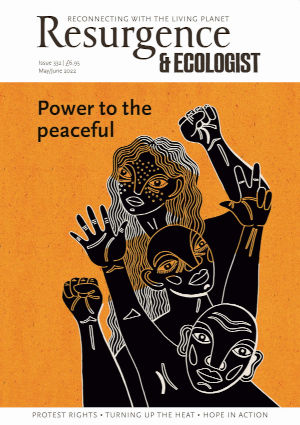In 2016, the biologist E.O. Wilson published Half-Earth, arguing that we ought to give up half the planet to Nature, free of humans, in order to protect biodiversity. It’s an idea as simple as it is radical; as difficult to argue against as it is to advocate. In their book Half-Earth Socialism, indebted to Wilson’s thesis, Troy Vettese and Drew Pendergrass bravely take on the task of making the case that rewilding half the Earth is a necessary condition of averting the worst of the intersecting crises of climate, Nature and future pandemics, and that only socialism will get us there.
The central thrust of the book argues the need for central planning in order to stay the course through the decades ahead, while eliminating markets almost completely. The logic of capital accumulation and the humanisation of Nature will take the planet off a cliff, the inevitable conclusion being uncoordinated attempts at geoengineering that are liable to end in complete disaster. Instead, the climate crisis demands conscious decision-making based on all the best available data, with a particular aim of radically transforming land use so that more and more can be rewilded each year.
The authors make a good attempt at rescuing conservation from the shadow of colonialism, while chastising traditions of the left for Promethean impulses. But whether you find their positions to be persuasive almost feels like a moot point when the outcome they are advocating feels so vanishingly far away from where we are now. Sure, things seem unchanging until suddenly they are not, but it does feel like a stretch of credulity to bother setting out how certain models of central planning could limit warming to 1.5 degrees when that means slashing emissions by half in the next eight years alone.
What is the revolutionary agent for any completely unprecedented system of global government, let alone a devoutly socialist one? From where will such a movement build its power in the next… three years at most? The authors offer nothing on this front other than a few vague references to a “revolution” preceding the state of affairs they describe.
In fairness to Vettese and Pendergrass, they are under no obligation to plot a roadmap from the actually existing 2022 to their imagined mid-century of global, ecological socialism. It’s their book, and it’s a task enough to rehabilitate the reputation of central planning while situating it within a hitherto untested framework of sound ecological principles. Furthermore, they say that this book is to be read explicitly as a utopian text in the tradition of William Morris, indicating that they realise that this vision feels far-fetched.
The final chapter of the book is literally a piece of fiction that imagines a man’s experience of 2049, inspired by Morris’s novel News from Nowhere. It’s striking that, for a utopia, it could easily be read as a dystopia for a lot of contemporary western citizens: energy quotas, enforced veganism, manual labour for everyone, and daily participation in protracted democratic decision-making. Basically, life would be one huge climate camp.
It may sound austere, but it’s refreshing to read utopic writing that doesn’t rely on glib technofixes and promises of near limitless abundance, visions that have an obvious allure but can ultimately be unpersuasive. Vettese and Pendergrass’s is a humble utopia. There is solidarity, fulfilment, full bellies, and plenty of leisure time. Crucially, there is a climate in repair, which is more than enough to win me over in my darkest hours, and certainly a utopia compared to many of the more plausible versions of the mid-21st century. How we arrive at this future is another question entirely.







